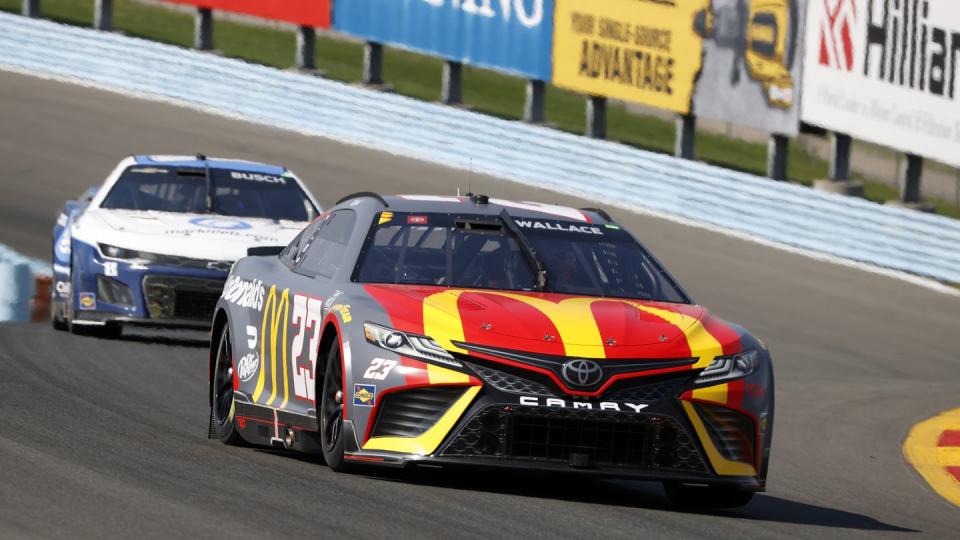Small Teams Rise Up: Drivers welcome Parity to NASCAR Cup Playoffs

No team considered a superpower in the sport—Hendrick Motorsports, Team Penske, Joe Gibbs Racing and Stewart-Haas Racing—placed all of its cars in the playoffs.
Two of Hendrick’s four teams, two of Penske’s three, three of JGR’s four and one of SHR’s four earned berths in the post-season.
Michael McDowell believes the opportunity to win races is greater for the small teams now than with the previous car.
In a NASCAR Cup Series playoff field that has a record 10 teams represented, half of the 16-drivers come from organizations with two cars or less, an unheard-of statistic just three years ago.
No team considered a superpower in the sport—Hendrick Motorsports, Team Penske, Joe Gibbs Racing and Stewart-Haas Racing—placed all of its cars in the playoffs. Two of Hendrick’s four teams, two of Penske’s three, three of JGR’s four and one of SHR’s four earned berths in the post-season.
RFK Racing and 23XI Racing are the only two-car teams that had both entries make the playoffs, and single-car team JTG Daugherty gained a berth via its season opening victory in the Daytona 500.

This season’s playoffs possess a different look from previous years due to one thing—parity.
“I think everybody’s getting more of a handle on this race car,” says Ricky Stenhouse Jr., the only single-car team in the playoffs. “Last year, I felt like the bigger teams really were able to kind of advance their learning curve faster.
“We hit on some things throughout the race, or throughout the season last year that we were like, ‘Dang, we got it figured out.’ Then all of a sudden we kind of missed it for a long time. So, I think those guys (big teams) were able to evolve and really learn a lot quicker. Now that this is our second season with this car, us and Front Row (Motorsports) and some other teams started figuring these cars out a little bit more and everybody became more competitive. The whole field got tighter. Just a lot more competitive this year than it was last year.”
Martin Truex Jr. believes the field is the “closest that it’s ever been.”
“Everything is so close now that there’s no room for error,” Truex says. “You have a couple of bad races and you’re out, and that’s what we’ve seen with some guys.”
Due to the parity, Kyle Busch believes the biggest gains in a race are made when others make mistakes.
“Ross (Chastain) and Kyle (Larson) got in a car fight at Darlington earlier this year, they knocked themselves out. They knocked themselves down in points,” Bush says. “It’s because you’re trying to get that position. You know you’ve got to put that other guy in a bad spot to get them to lift in order to get that position. You’re either going to crash or you’re both gonna crash.”

Michael McDowell believes the opportunity to win races is greater for the small teams now than with the previous car.
“At no point do I feel like we’re ever completely out of the game,” McDowell says. “The gap is so tight now that you’re only a few things away from getting it right and being in contention. Used to be you’d go to a mile-and-a-half (track) and the top-five guys would be three-, four- or five-tenths faster than 20th. Now they’re a tenth faster. So, every little detail of execution matters on the race car and setup.”
McDowell also notes a smaller team possesses some benefits. Those include being able to adapt and move quickly.
“We’re able to be pretty nimble and make some decisions on the fly,” McDowell says. “We don’t have such a big assembly line and production line and 600 people. We’ve got 45, 50 people working on the Cup team. If we want to do something differently, we just have a shop meeting on Tuesday morning at 6:30 and say here’s how we’re going to do it. It doesn’t take meetings on meetings and meetings and production and managers. We just say ‘All right. This is how we’re going to do it.’ But if you asked me if I would rather have a lot of people and a lot of resources or be small, I’d rather have a lot of people and a lot of resources.”
23XI Racing, which was started from scratch, placed both of its cars in the playoffs in just its third full season, and it’s an accomplishment that’s left team co-owner Denny Hamlin with a great deal of pride.
Brad Keselowski had hoped RFK Racing would make the playoffs in his first year of co-ownership, but he had to wait until his second when he and teammate Chris Buescher both made the postseason. It’s an accomplishment that Keselowski described as a “high watermark” considering it’s the first time Roush has had a car in the playoffs since 2019 and the first time it’s had two cars in post-season in 2014.
“The key thing for me is to be pleased, not satisfied,” Keselowski says. “We still have a long way to go … to get everything we can get out of ourselves.”

 Yahoo Autos
Yahoo Autos 